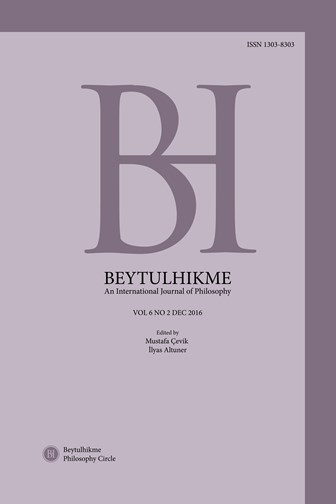Author :
Abstract
Adalet kuramı bağlamında, siyaset felsefesindeki temel tartışmalardan biri de adil bir siyasal düzenin temelini oluşturan "doğal hukuk" anlayışının nasıl temellendirileceğidir. Bu açıdan ana hatlarıyla düşünce tarihine baktığımızda, iki temel yaklaşımla karşılaşırız. Bunlardan biri ve en çok taraftar bulanı, J.-J. Rousseau, T. Hobbes, J. Locke ve 20. Yüzyılda J. Rawls gibi düşünürler tarafından temsil edilen sözleşmeci ve rasyonalist yaklaşımken, diğeri D. Hume ve 20. Yüzyılda Hayek ve Nozik'te ifadesini bulan sözleşme karşıtı empirist yaklaşımlardır. Makalemiz sözleşmeci rasyonalist yaklaşımlara karşı D. Hume'un empirist argümanlarını konu edinmektedir.
Keywords
Abstract
One of the main discussions in the political philosophy within the context of the theory of justice is that how the understanding of the “natural law,” which constitutes the basis of a fair political order, would be grounded. In this respect, when we look at the history of thought in general, we encounter with two fundamental approaches. The one which has attracted most supporters is the contractarian and rationalist approach which has been represented by the philosophers such as J.-J. Rousseau, T. Hobbes, J. Locke and in the 20th century J. Rawls; others are the anti-contractarian and empiricist approaches which have found expression through the philosophers like D. Hume and in the 20th century Hayek and Nozik. Our paper deals with the empiricist arguments of D. Hume against the contractarian rationalistic approaches.
Keywords
- Chwaszcza, C. (2013). Hume and the Social Contract: A Systematic Evaluation. Rationality, Markets and Morals: Studies at the Intersevction of Philosophy and Economics, 4, 2013, 108–130.
- Çelik, S. (2010). Bilgi Felsefesi: İlkçağ’dan Yeniçağ’a. İstanbul: Doruk Yayınları.
- Evgin, S. (2010). Aydınlanma Döneminde Doğal Hukuk Düşüncesinin Gelişimi. Yayım- lanmamış YL Tezi. Mersin: Mersin Üniversitesi Sosyal Bilimler Enstitüsü.
- Östbring, B. (2011). David Hume and Contemporary Realism in Political Theory. Lund University Fall Semester 2011 - STVM11. Lund: Lund University Department of Political Science.
- Hampsher-Monk, M. L. (2004). Siyasal Düşünceler Tarihi (çev. N. Arat vd.). İstan- bul: Say Yayınları.
- Hobbes, T. (1992). Leviathan (çev. S. Lim). İstanbul: Yapı Kredi Yayınları.
- Hume, D. (1997). İnsan Doğası Üzerine Bir İnceleme (çev. A. Yardımlı). İstanbul: İdea Yayınevi.
- Kılınç, Z. A. (2004). Hume’s Liberalism an Early of Social Capital. PhD. Thesis. Pittsburgh: University of Pittsburgh Faculty of Arts and Sciences.
- Kırlı, Ö. (2013). John Locke ve David Hume'un Epistemolojisi ve Beşeri Olanın İzahı. Yönetim: Uluslararası Yönetim İktisat ve İşletme Dergisi, 20.
- Krause, S. R. (2004). Political Theory: Hume and the (False) Luster of Justice Political Theory, 32 (5), 628-655.
- Rousseau, J.-J. (1990). Toplum Sözleşmesi (çev. V. Günyol). İstanbul: Türkiye İş Bankası Kültür Yayınları.
- Rousseau, J.-J. (2004). İnsanlar Arasındaki Eşitsizliğin Kaynağı (çev. R. N. İleri). İstanbul: Say Yayınları.
- Skirbekk, G. & Gilje, N. (1971). Antik Yunan’dan Modern Döneme Felsefe Tarihi (çev. E. Akbaş, Şule Mutlu). İstanbul: Üniversite Kitabevi Yayınları.
- Yayla, A. (2002). Liberalizm. Ankara: Liberte Yayınları.
- Yellin, M. E. (2008). Indirect Utility, Justice, and Equality in the Political Tho- ught of David Hume. Journal of Medicine and Philosophy, 24, 352-364. Öz: Adalet kuramı bağlamında, siyaset felsefesindeki temel tartışmalardan biri de adil bir siyasal düzenin temelini oluşturan "doğal hukuk" anlayışının nasıl temellendirileceğidir. Bu açıdan ana hatlarıyla düşünce tarihine baktığımızda, iki temel yaklaşımla karşılaşırız. Bunlardan biri ve en çok taraftar bulanı, J. J. Rousseau, T. Hobbes, j. Locke ve 20. Yüzyılda J. Rawls gibi düşünürler tarafından temsil edilen sözleşmeci ve rasyonalist yaklaşımken, diğeri D. Hume ve 20. Yüzyılda Hayek ve Nozik'te ifadesini bulan sözleşme karşıtı empirist yaklaşımlardır. Makalemiz sözleşmeci rasyonalist yaklaşımlara karşı D. Hume'un empirist argümanlarını konu edinmektedir. Anahtar Kelimeler: Doğal hukuk, toplum sözleşmesi, mülkiyet, hükümet, empirizm.
